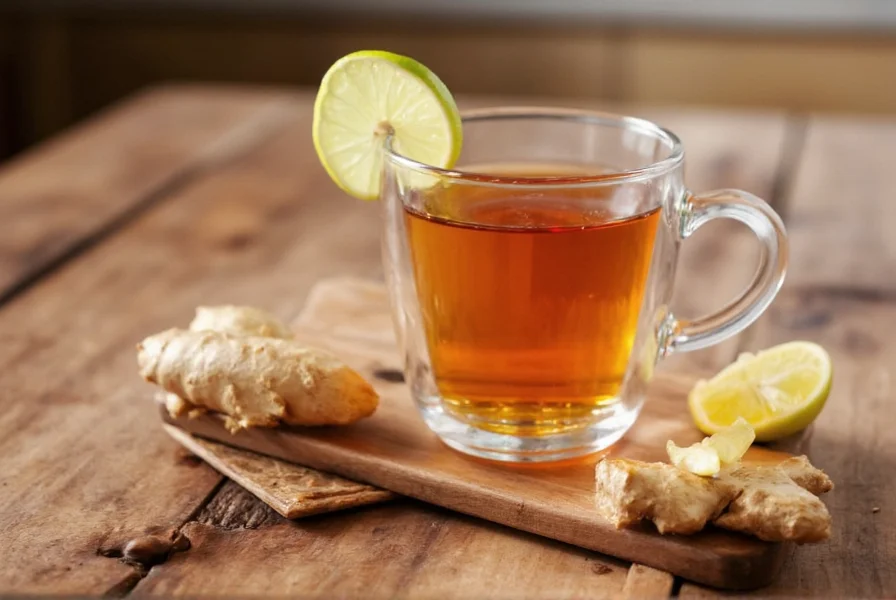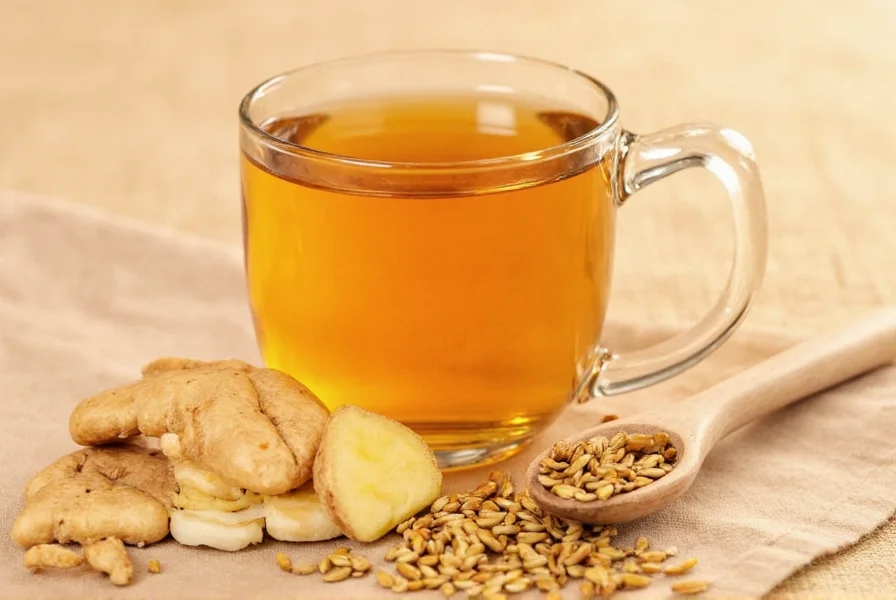No, pure ginger tea does not contain caffeine. Ginger tea is an herbal tea made from the roots of the Zingiber officinale plant, and unlike true teas (black, green, white, and oolong) which come from the Camellia sinensis plant and naturally contain caffeine, herbal teas like ginger are naturally caffeine-free. This makes ginger tea an excellent choice for those avoiding caffeine for health reasons, evening consumption, or sensitivity.
Understanding whether your favorite beverage contains caffeine is crucial for many people managing their daily intake. If you're searching for does ginger tea have caffeine, you've come to the right place for accurate, science-backed information. Let's explore this topic in depth to clarify any confusion about ginger tea and caffeine content.
What Makes Ginger Tea Different From Traditional Teas
Ginger tea belongs to the herbal tea category, which fundamentally differs from true teas. While black tea, green tea, white tea, and oolong tea all derive from the Camellia sinensis plant (which naturally contains caffeine), ginger tea is made from the rhizomes (roots) of the ginger plant. This botanical distinction is why pure ginger tea is naturally caffeine-free.
When examining does pure ginger tea have caffeine, it's important to understand that true herbal infusions like ginger, chamomile, peppermint, and rooibos don't contain any caffeine unless specifically blended with caffeinated ingredients.
Understanding Caffeine in Beverages
Caffeine occurs naturally in certain plants as a defense mechanism against pests. The primary sources of caffeine in beverages include:
| Beverage Type | Natural Caffeine Source | Typical Caffeine Content |
|---|---|---|
| Black Tea | Camellia sinensis plant | 40-70mg per 8oz cup |
| Green Tea | Camellia sinensis plant | 20-45mg per 8oz cup |
| Coffee | Coffee beans | 95-200mg per 8oz cup |
| Pure Ginger Tea | No natural source | 0mg per 8oz cup |
When Ginger Tea Might Contain Caffeine
While pure ginger tea is caffeine-free, you should be aware that some commercial products might contain caffeine if they're blended with other ingredients. Many tea companies create ginger tea blends that include black or green tea, which would introduce caffeine to the beverage.
When shopping for ginger tea, check the ingredient list carefully. If you see:
- Ginger root or Zingiber officinale as the only ingredient - it's caffeine-free
- Black tea, green tea, or Camellia sinensis listed - it contains caffeine
This distinction is particularly important if you're specifically seeking caffeine free tea alternatives for evening consumption or if you're sensitive to caffeine.
Benefits of Choosing Caffeine-Free Ginger Tea
Choosing pure ginger tea offers several advantages beyond being caffeine-free:
- Digestive support - Ginger contains compounds like gingerol that may help with nausea and digestion
- Nighttime beverage - Unlike caffeinated teas, ginger tea won't interfere with sleep patterns
- Hydration option - Provides a flavorful alternative to plain water without diuretic effects of caffeine
- Low calorie - Naturally calorie-free when consumed without sweeteners
For those asking is ginger tea caffeine free because of medical conditions or pregnancy, pure ginger tea is generally considered safe, though consulting with a healthcare provider is always recommended for specific health concerns.
Scientific Perspective on Ginger Tea Composition
Multiple studies have confirmed that ginger (Zingiber officinale) contains no caffeine or related methylxanthines. Research published in the Journal of Agricultural and Food Chemistry analyzed various herbal teas and found no detectable caffeine in pure ginger preparations.
When examining ginger root tea caffeine content, scientists look for the presence of xanthine alkaloids, which include caffeine, theobromine, and theophylline. These compounds are absent in ginger rhizomes, confirming its naturally caffeine-free status.

Comparing Ginger Tea to Other Caffeine-Free Options
If you're exploring natural caffeine free tea options, here's how ginger compares to other popular herbal choices:
| Herbal Tea | Flavor Profile | Primary Benefits | Caffeine Content |
|---|---|---|---|
| Ginger | Spicy, warming, pungent | Digestion, nausea relief, anti-inflammatory | 0mg |
| Chamomile | Floral, apple-like | Relaxation, sleep support | 0mg |
| Peppermint | Cooling, refreshing | Digestion, headache relief | 0mg |
| Rooibos | Earthy, slightly sweet | Antioxidants, heart health | 0mg |
Practical Tips for Ensuring Caffeine-Free Ginger Tea
To guarantee you're drinking caffeine-free ginger tea:
- Choose products labeled "pure ginger" or "100% ginger root"
- Read ingredient lists carefully for any mention of tea leaves
- Look for certifications like "naturally caffeine-free" on packaging
- When in doubt, contact the manufacturer directly
- Consider making your own by steeping fresh ginger slices
For those specifically researching ginger tea vs green tea caffeine content, the difference is clear: green tea typically contains 20-45mg of caffeine per cup, while pure ginger tea contains zero.

Addressing Common Misconceptions
Several misconceptions exist around ginger tea and caffeine:
- Misconception: All "teas" contain caffeine
Reality: Only true teas (from Camellia sinensis) contain caffeine; herbal infusions are technically tisanes and are caffeine-free - Misconception: Ginger tea has a stimulating effect like caffeinated beverages
Reality: Any energizing effect from ginger comes from its warming properties, not caffeine - Misconception: Commercial ginger tea always contains caffeine
Reality: Pure ginger tea products are caffeine-free, but blends may contain caffeine
Conclusion
When asking does ginger tea have caffeine, the definitive answer is no—pure ginger tea contains no caffeine. This makes it an excellent choice for anyone seeking a flavorful, therapeutic beverage without caffeine's stimulating effects. Whether you're avoiding caffeine for health reasons, sensitive to its effects, or simply prefer evening beverages that won't disrupt your sleep, pure ginger tea delivers all the benefits of this ancient medicinal root without any caffeine content.
Remember to check product labels for blends that might include traditional tea leaves, and when in doubt, opt for products clearly labeled as pure ginger or make your own from fresh ginger root for complete certainty about your caffeine free tea alternatives.
Does all ginger tea contain zero caffeine?
Pure ginger tea made solely from ginger root contains zero caffeine. However, some commercial ginger tea products are blended with black or green tea, which would contain caffeine. Always check the ingredient list to confirm if your ginger tea is pure or blended with caffeinated teas.
Can I drink ginger tea before bed without worrying about caffeine?
Yes, pure ginger tea is naturally caffeine-free and makes an excellent bedtime beverage. Unlike traditional teas that contain caffeine, ginger tea won't interfere with your sleep cycle. Many people find its warming properties and potential digestive benefits actually promote better sleep.
How can I be sure my ginger tea is caffeine-free?
To ensure your ginger tea is caffeine-free, look for products labeled "pure ginger," "100% ginger root," or "naturally caffeine-free." Check the ingredient list for any mention of black tea, green tea, or Camellia sinensis. When in doubt, contact the manufacturer directly or make your own tea using fresh ginger root.
Does ginger have any stimulating effects similar to caffeine?
Ginger may provide a warming sensation and mild metabolic boost due to its active compounds like gingerol, but this is fundamentally different from caffeine's stimulant effects. Ginger doesn't affect the central nervous system like caffeine does, nor does it provide the same type of energy boost or potential for dependence.
Frequently Asked Questions
Does all ginger tea contain zero caffeine?
Pure ginger tea made solely from ginger root contains zero caffeine. However, some commercial ginger tea products are blended with black or green tea, which would contain caffeine. Always check the ingredient list to confirm if your ginger tea is pure or blended with caffeinated teas.
Can I drink ginger tea before bed without worrying about caffeine?
Yes, pure ginger tea is naturally caffeine-free and makes an excellent bedtime beverage. Unlike traditional teas that contain caffeine, ginger tea won't interfere with your sleep cycle. Many people find its warming properties and potential digestive benefits actually promote better sleep.
How can I be sure my ginger tea is caffeine-free?
To ensure your ginger tea is caffeine-free, look for products labeled "pure ginger," "100% ginger root," or "naturally caffeine-free." Check the ingredient list for any mention of black tea, green tea, or Camellia sinensis. When in doubt, contact the manufacturer directly or make your own tea using fresh ginger root.
Does ginger have any stimulating effects similar to caffeine?
Ginger may provide a warming sensation and mild metabolic boost due to its active compounds like gingerol, but this is fundamentally different from caffeine's stimulant effects. Ginger doesn't affect the central nervous system like caffeine does, nor does it provide the same type of energy boost or potential for dependence.











 浙公网安备
33010002000092号
浙公网安备
33010002000092号 浙B2-20120091-4
浙B2-20120091-4